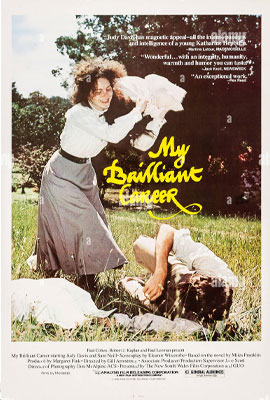
(1979)
directed by Gillian Armstrong
“Here is the story of my career. My brilliant career. I make no apologies for being egotistical because I am.” This is how Sybylla introduces herself in the spoken narration that opens the film. She is writing these lines in her diary while a ferocious sand storm rattles the windows in the family home in the drought stricken Australian outback. The “brilliant career” the teenage Sybylla is referring to exists only in her imagination. She is positive, though, that she belongs in the world of art and literature.
The violent sand storm is the perfect setting to introduce us to Sybylla. With her flashing eyes, frizzy red hair, and countless freckles, Sybylla is a force of nature. She bemoans her stifling life in the backcountry and craves independence above all else. “My Brilliant Career” is about breaking free from a conventional life and being true to oneself. Director Gillian Armstrong’s first feature film is based on Miles Franklin’s semi-autobiographical novel “My Brilliant Career” which was published in 1901. Franklin’s novel was a pioneering feminist work which was published long before the struggle for women’s rights became a political movement.
Headstrong Sybylla is played by Judy Davis in a performance of truly epic proportions. Davis landed the role of Sybylla straight out of drama school. Mel Gibson was a classmate in drama school and they starred together as Romeo and Juliet in a school production of Shakespeare’s play. I don’t know if there is a film of their performance, but if there is, I would be thrilled to watch it!
It is impossible to imagine anyone besides Judy Davis playing the part of Sybylla. Judy Davis is simply magnificent. When she enters a room, it is impossible to look at anyone else. She is beautiful, talented, and able to disarm all opposition with Oscar Wilde level quips. At the same time, she somehow manages to suggest a great fragility behind her fiery temperament. I was so struck by Judy Davis’s performance in “My Brilliant Career,” that I wanted to see what she was like in real life. I watched her in an interview on the Criterion Channel. I was awed by the intelligence and sensitivity she displayed during the interview.
Sybylla is determined not to be like her mother who leads an isolated life in the Australian outback. She is overjoyed when she is sent to live with her wealthy grandmother. At first, the local gentry dismiss her as too plain and too unrefined. Aunt Helen takes Sybylla under her wing, however, and instigates a makeover. Sybylla is told she can’t look in any mirrors while the makeover is underway. A new dress is ordered, the sunburn fades, and the hair is tamed a bit. Sybylla is transformed into a vivacious beauty. After her makeover, when Sybylla finally looks in a mirror, her reaction is priceless. She barely recognizes herself! With its beautiful antiques and lovely period pieces, her grandmother’s home is the perfect setting for Sybylla’s coming out. When Sybylla plays piano at the gathering, any remaining doubters are won over by her performance. This scene is one of my favorites.
When the handsome landowner Harry Beecham (Sam Neill) is charmed by Sybylla’s sparkling personality and unruly behavior and begins to court her, Sybylla must decide whether she can reconcile the prospect of marriage with the life as a writer she has envisioned for herself. This is not a film about a young woman who is looking for the right person to share her life with. It is about a young woman who is absolutely determined to stand on her own two feet.
The film ends just as it began, with Sybylla writing in her diary. She is writing down her thoughts about possibly marrying Harry Beecham. “My Brilliant Career” is a stunning portrait of a very spirited young lady.
I was so swept away by this movie that I decided to read Miles Franklin’s book, “My Brilliant Career.” The book recounts the hardships of life in the Australian outback. The scenes of drought and of settlers tending to their starving livestock are even more brutal than in the movie. While I was reading, Sybylla was still Judy Davis in my mind. Who else could play the role half so well? Here are Sybylla’s words from the ending of Miles Franklin’s magnificent book:
“I am proud that I am an Australian, a daughter of the Southern Cross, a child of the mighty bush. I am thankful I am a peasant, a part of the bone and muscle of my nation, and earn my bread by the sweat of my brow, as man was meant to do. I rejoice I was not born a parasite, one of the blood-suckers who loll on velvet and satin, crushed from the proceeds of human sweat and blood and souls…
The great sun is sinking in the west, grinning and winking knowingly as he goes upon the starving stock and drought-smitten wastes of land. Nearer he draws to the gum-tree scrubby horizon, turns the clouds to orange, scarlet, silver flame, gold. Down, down he goes. The gorgeous, garish splendor of sunset pageantry flames out; the long shadows eagerly cover all; the kookaburras laugh their merry mocking goodnight; the clouds fade to turquoise, green, and gray; the stars peep shyly out; the soft call of the mopoke arises in the gullies! With much love and good wishes to all. Goodnight! Goodbye!”
I was overcome with emotion the first time I read this magnificent passage! After all, this passage is from Sybylla’s precious book! The very same book Sybylla mailed to the publisher in the movie!